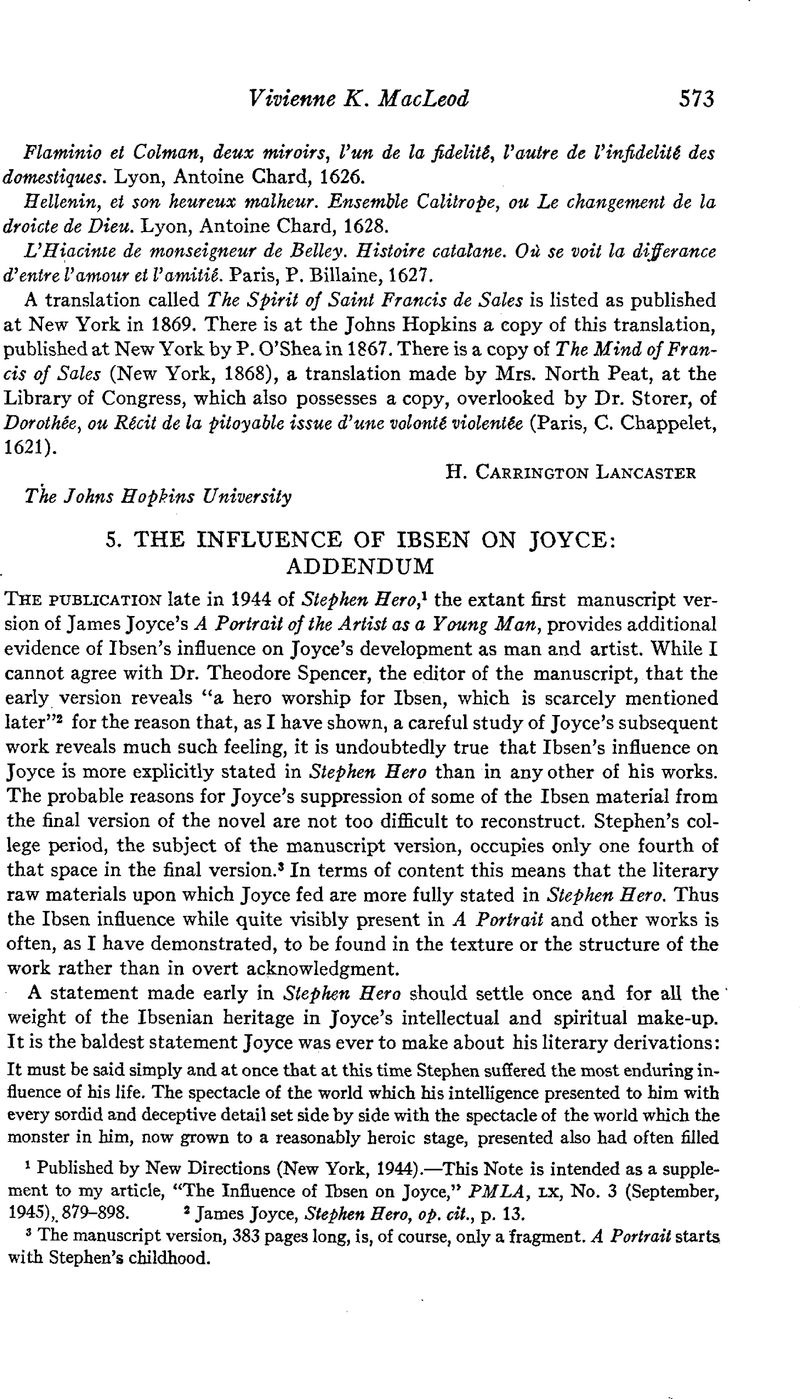No CrossRef data available.
Article contents
The Influence of Ibsen on Joyce: Addendum
Published online by Cambridge University Press: 02 December 2020
Abstract

- Type
- Comment and Criticism
- Information
- Copyright
- Copyright © Modern Language Association of America, 1947
References
1 Published by New Directions (New York, 1944).—This Note is intended as a supplement to my article, “The Influence of Ibsen on Joyce,” PMLA, lx, No. 3 (September, 1945), 879-898.
2 James Joyce; Stephen Hero, op. cit., p. 13.
3 The manuscript version, 383 pages long, is, of course, only a fragment. A Portrait starts with Stephen's childhood.
4 Apparently English translations were more difficult to get in Dublin than in England. See my article, op. cit., p. 880, footnote 14.
5 Dr. Spencer's symbol for indicating “slashed” material in Joyce's own hand with a red or blue crayon stroke.
6 The editor tells us the original wording is indicated by the material in brackets, with the amended wording following. Joyce, Stephen Hero, op. cit., p. 18.
7 Ibid., pp. 40-41.
8 Apparently the very one published by Joyce as “Ibsen's New Drama” in the Fortnightly Review (April, 1900).
9 Stephen Hero, op. cit., p. 86.
10 Ibid., p. 87.
11 See my article, p. 885, especially footnote 39.
12 Stephen Hero, op. cit., p. 88.
13 Ibid.
14 Ibid., p. 86. This remark serves as well to point up the critical quality of Stephen's Ibsenian devotions.
15 Ibid., pp. 45-46.
16 Ibid., p. 92.
17 Ibid., p. 95.
18 Ibid., p. 96.
19 See my article, op. cit., pp. 885-886.
20 Stephen Hero, op. cit., p. 48.
21 Ibid., p. 21.
22 Ibid., pp. 109-110. See these pages as well for a fuller portrait of Simon Dedalus, from the “cost” of whose “reckless liberality … his household had to suffer both in deed and in spirit,” and also for the curious similarity to Ibsen's own father. See footnote 19.
23 Stephen Hero, op. cit., pp. 126-127.
24 Ibid., p. 132.
25 Wiegand, for one, among recent interpreters of Ibsen writes: “An idea similar to Solness' conception of himself as a chosen, elect individual had played a leading role in Ibsen's early thinking; he, too, had thought of himself as endowed with a special mission. … Ibsen felt that God had singled him out for a mission like the Old Testament prophets, he had heard the summons calling him to be a moral leader to his people.” See Hermann J. Wiegand, The Modern Ibsen (New York: Henry Holt & Co., 1925), pp. 301, 307, 308. Compare the above with the following “… he [Stephen] was persuaded that no-one served the generation into which he had been born so well as he who offered it, whether in his art or in his life, the gift of certitude.” Stephen Hero, op. cit., p. 76.
26 Stephen's emphasis is significant. Joyce's early and instinctively sound rejection of Ibsen in the rôle of clinician coincided with Ibsen's own view of his achievement: “Nineteen years after writing A Doll's House Ibsen remarked in the course of an address: ‘I have been more of a poet and less of a social philosopher than people are generally inclined to believe’.” Wiegand, H., op. cit., p. 75.
27 Stephen Hero, op. cit., p. 52.
28 Ibid., p. 33.
29 Ibid., p. 135.
30 Ibid., p. 179.
31 Ibid., pp. 102-103.
32 Thus, the solemn high romanticism of Stephen's declaration to Emma: “I felt that I longed to take you in my arms—your body. I longed for you to take me in your arms. That's all… Just to live one night together, Emma, and then to say goodbye in the morning and never to see each other again! There is no such thing as love in the world: only people are young.” Stephen Hero, op. cit., p. 198. But Emma, unlike the compliant heroine of Ibsen's play, thinks Stephen is mad. And Joyce, his humor never deserting him for long, has Lynch point out to Stephen that “it was the most original attempt at seduction of which he had ever heard, so original that … ‘No girl with an ounce of sense would listen to you. That's not the way to go about it man. You run out suddenly after her, come up sweating and puffing and say ”Let us lie together.“ Did you mean it as a joke?’ ” Ibid., pp. 200-201. But Stephen defends himself ably on the basis of a conception of love taken from Ibsen (developed in Love's Comedy, The Doll's House, The Lady from the Sea, When We Dead Awaken, and other works): “But a woman is incidentally a human being: and a human being's love and freedom is not a spiritual asset of the State … A human being can exert freedom to produce or to accept, or love to procreate or to satisfy. Love gives and freedom takes …” Ibid., pp. 202-203. Interestingly, Halvdan Koht notes in The Life of Ibsen that in the first draft of Pillars of Society Dina Dorf wished “to enter into a free unconventional marriage with the man she loved; she had learned ‘to hate promises’,” 11, p. 142.
33 Stephen Hero, p. 174.
34 For more on this subject see “The Influence of Ibsen on Joyce,” op. cit., p. 883.
35 Stephen Hero, op. cit., p. 135.
36 I have discussed the relation of this poem to Ibsen's thinking at some length in “The Influence of Ibsen on Joyce.”
37 Stephen Hero, op. cit., p. 35, footnote *.
38 This term, by extension, has come to be used by Ibsen's interpreters as a description of his own method. For example, Montrose Moses in Henrik Ibsen titles the chapter dealing with Ghosts, “The Torpedo Beneath the Ark.”
39 Ibid., p. 210.


